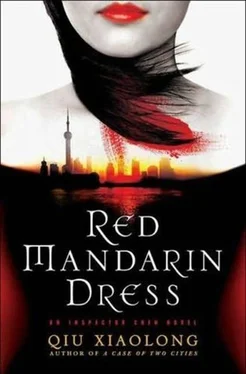“Aren’t they anxious to punish Jia-as an example to troublemakers for the government?”
“But not punished like that, nor at the present moment. It could backfire. Of course, that’s just my guess-”
The phone rang, unusually loud in the empty judge’s room. It was Professor Bian, who had had an appointment with Chen that morning. The student had failed to show up.
“I know you’re busy, but your paper is quite original. I would like to know how it is progressing.”
“I’ll turn the paper in on time,” Chen said. “I’m just having some problems with the conclusion.”
“It’s difficult to push for a generalization in a term paper,” Bian said. “Your topic is a big one. If you can succeed in finding a shared tendency among a number of stories, it should be good enough. In the future, you may try to develop that into your MA thesis.”
Chen wondered if he would be able to do so. He didn’t say anything immediately in response. And he was beginning to have second thoughts about his studies.
After all, it was just one more interpretation of the old texts. People would go on reading, with or without his interpretation. There might have been a sort of anti-love discourse of arranged marriage in Chinese culture, or something like an archetype of the Chinese femme fatale. But so what? Each story was different, each author was different. Like in criminal cases, a cop can hardly apply a general theory to all of them.
“Yes, I’ll think about it, Professor Bian. And I’ve got some new ideas about ‘thirsty illness.’ ”
So his literature project might still be something to think about in the future, he told himself. For now, he had to shelve it.
For him, there might be something more immediate, more relevant. As in the murder case: people might not feel satisfied by a partial conclusion, but at least the killing of innocent people had come to an end. As a cop, he didn’t have to worry too much about making his point, unlike a paper. What the point of the case was, he didn’t even know-
“You aren’t going on with your Chinese literature program, are you?” Yu queried, breaking into his thoughts.
“No, I don’t think so. You don’t have to worry about that,” Chen said. “But I still have to finish this paper. You may not believe it, but this paper has really helped.”
Yu seemed relieved and handed back the envelope. “Oh, there’s a piece of paper in the envelope.”
“A poem.”
“For you to publish?”
Chen took out that piece of paper and started reading.
Mother, I have tried to make the far-off echo
yield a clue to what is happening to me;
in the old mansion people come and go,
seeing only what they want to see.
The recall of the red mandarin dress
wears me out, flashing in the flowers,
your bare feet, your soft hand: the stress
of memory strips me of waking hours.
But we are flattened, framed in the zoom
of one moment, click, and cloud and rain
approaching fast, a doomful gloom
scurries across the horizon again,
Oh that is all I know, all I see.
Mother, you drink the cup for me.
“There’s no cup in the picture,” Yu said in bewilderment.
Chen wasn’t sure if the last image about the cup came from Hamlet, in which the queen drinks the poison for her son. In his college years, he had read a Freudian interpretation of it. He vaguely remembered.
“It’s about Hamlet and his mother,” Chen said, deciding not to explain any more. “There are more things in heaven and earth than in a case report.”
“I’m damned,” Yu said, shaking his head like a rattle drum.

***















